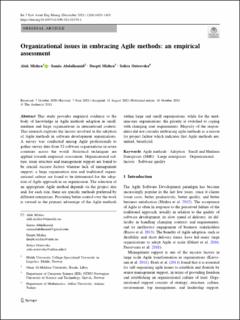Organizational issues in embracing Agile methods : an empirical assessment
Peer reviewed, Journal article
Published version
Permanent lenke
https://hdl.handle.net/11250/3099202Utgivelsesdato
2021Metadata
Vis full innførselSamlinger
Originalversjon
International Journal of System Assurance Engineering and Management. 2021, 12 (6), 1420-1433. 10.1007/s13198-021-01350-1Sammendrag
This study provides empirical evidence to the body of knowledge in Agile methods adoption in small, medium and large organizations in international context. This research explores the factors involved in the adoption of Agile methods in software development organizations. A survey was conducted among Agile professionals to gather survey data from 52 software organizations in seven countries across the world. Statistical techniques are applied towards empirical assessment. Organizational culture, team structure and management support are found to be crucial success factors whereas lack of management support, a large organization size and traditional organizational culture are found to be detrimental for the adoption of Agile approach in an organization. The selection of an appropriate Agile method depends on the project size and, for each size, there are specific methods preferred by different enterprises. Providing better control over the work is viewed as the primary advantage of the Agile methods within large and small organizations, while for the medium-size organizations, the priority is switched to coping with changing user requirements. Majority of the respondents did not consider embracing agile methods as a reason for project failure which indicates that Agile methods are, indeed, beneficial. Organizational issues in embracing Agile methods : an empirical assessment

